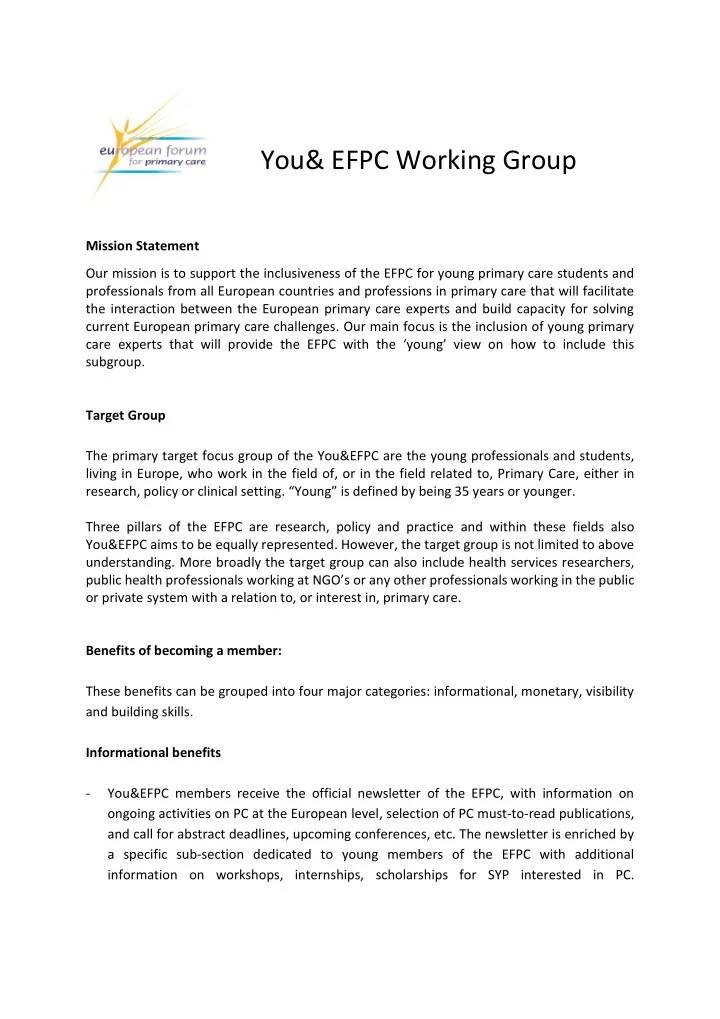

You& EFPC Working Group Mission Statement Our mission is to support the inclusiveness of the EFPC for young primary care students and professionals from all European countries and professions in primary care that will facilitate the interaction between the European primary care experts and build capacity for solving current European primary care challenges. Our main focus is the inclusion of young primary care experts that will provide the EFPC with the ‘young’ view on how to include this subgroup. Target Group The primary target focus group of the You&EFPC are the young professionals and students, living in Europe, who work in the field of, or in the field related to, Primary Care, either in research, policy or clinical setting . “Young” is defined by being 35 years or younger. Three pillars of the EFPC are research, policy and practice and within these fields also You&EFPC aims to be equally represented. However, the target group is not limited to above understanding. More broadly the target group can also include health services researchers, public health professionals working at NGO’s or any ot her professionals working in the public or private system with a relation to, or interest in, primary care. Benefits of becoming a member: These benefits can be grouped into four major categories: informational, monetary, visibility and building skills. Informational benefits - You&EFPC members receive the official newsletter of the EFPC, with information on ongoing activities on PC at the European level, selection of PC must-to-read publications, and call for abstract deadlines, upcoming conferences, etc. The newsletter is enriched by a specific sub-section dedicated to young members of the EFPC with additional information on workshops, internships, scholarships for SYP interested in PC.
- An online forum for young members is established. Students and Young Professionals (SYP) have the opportunity of sharing their projects, practices and researches, asks questions, and interact with more experienced members. The forum would serve as a contact point between EFPC young and senior members and aims to establish mutual cooperation processes for the development of PC. This forum will be established within the current EFPC forum infrastructure. - You&EFPC will have the opportunity to represent the students and young professionals in the Advisory Board of the European Forum for Primary care. - A database with internships, traineeships, scholarships in PC will be developed with the support of the EFPC. The database is supposed to be an information platform. It will include opportunities for both young researcher and young professionals. Each young member of the EFPC has the opportunity to access the database Monetary benefits - The following monetary benefits are just for young EFPC members: young professionals will have a 50% reduction of the fees for attending the annual European Forum for Primary Care Conference (fees for young professional = 112,5€) ; students will have a 75% reduction of the fees for attending the annual European Forum for Primary Care Conference (fees for students = 56.25€). Please note that the regular members’ fees are 225€. Visibility benefits - Two sessions entirely dedicated to young members of the EFPC are scheduled in the annual EFPC Conference. One session is dedicated to research, policy, and primary care practices, the other to elevator pitches. Only young members of the EFPC are allowed to submit an abstract related to the scope and the purpose of the conference for the research, policy and practices session or a curriculum vitae and cover letter for the elevator pitches session. In addition, the EFPC Conference will have a young best presentation awards and a young best elevator pitches awards. Young member of the EFPC have the unique opportunity to present themselves or their research/policy/practice to leading scholars in the field, getting known, and receive feedback.
Building skills benefits “Building skills” opportunities will be offered in cooperation with senio r members of the EFPC and will take the form of training on the job. Some examples are; - An annual building-skills workshop is offered to the EFPC members. The annual building-skills workshop is held in conjunction with the EFPC Conference, for example during the pre-conference. The topics of the workshops are selected on the basis of their relevance for student and young professionals in the early stage of their careers. Examples of topics that could be addressed during the workshops are: “how to write a research paper”, “how to get published in a scientific journal”, “how to improve your presentation skills”, “how to write your cv and cover letter”, “how to find a job”, “how to find an internship”, “exchange study opportunities”, “educational opportunities for higher degree”. Young member of the EFPC have to opportunity to acquire new competences and improve their skills, benefiting from the knowledge of experienced colleagues, professors, scholars and experts in the field. - Each young member of the EFPC has the opportunity to participate in online discussions/workshop with senior EFPC members on selected PC topics. In order to ensure an adequate numbers of attendees, young members need to register in advance. Online discussions/workshop will take place once every 3/4 months and are demand driven. The You&EFPC will nominate topics for discussion and together with the junior coordinator senior members will be asked to present. - You&EFPC members can express their interests for supporting senior EFPC members in the preparation of position papers. The expression of interests is not mandatory for You&EFPC members. - By participating in the management structure of the EFPC, for example in the Advisory Board, Scientific Committee etc.
Recommend
More recommend